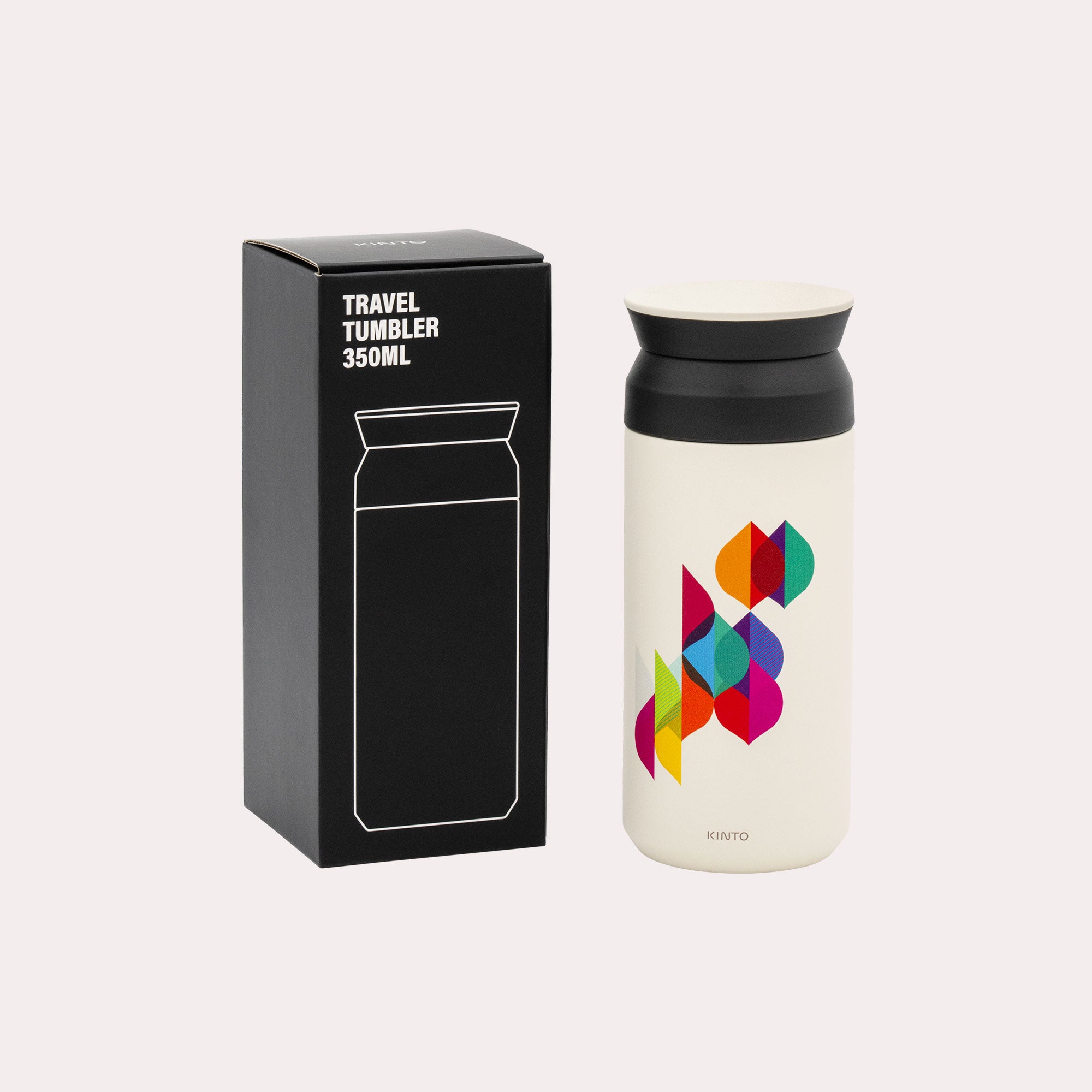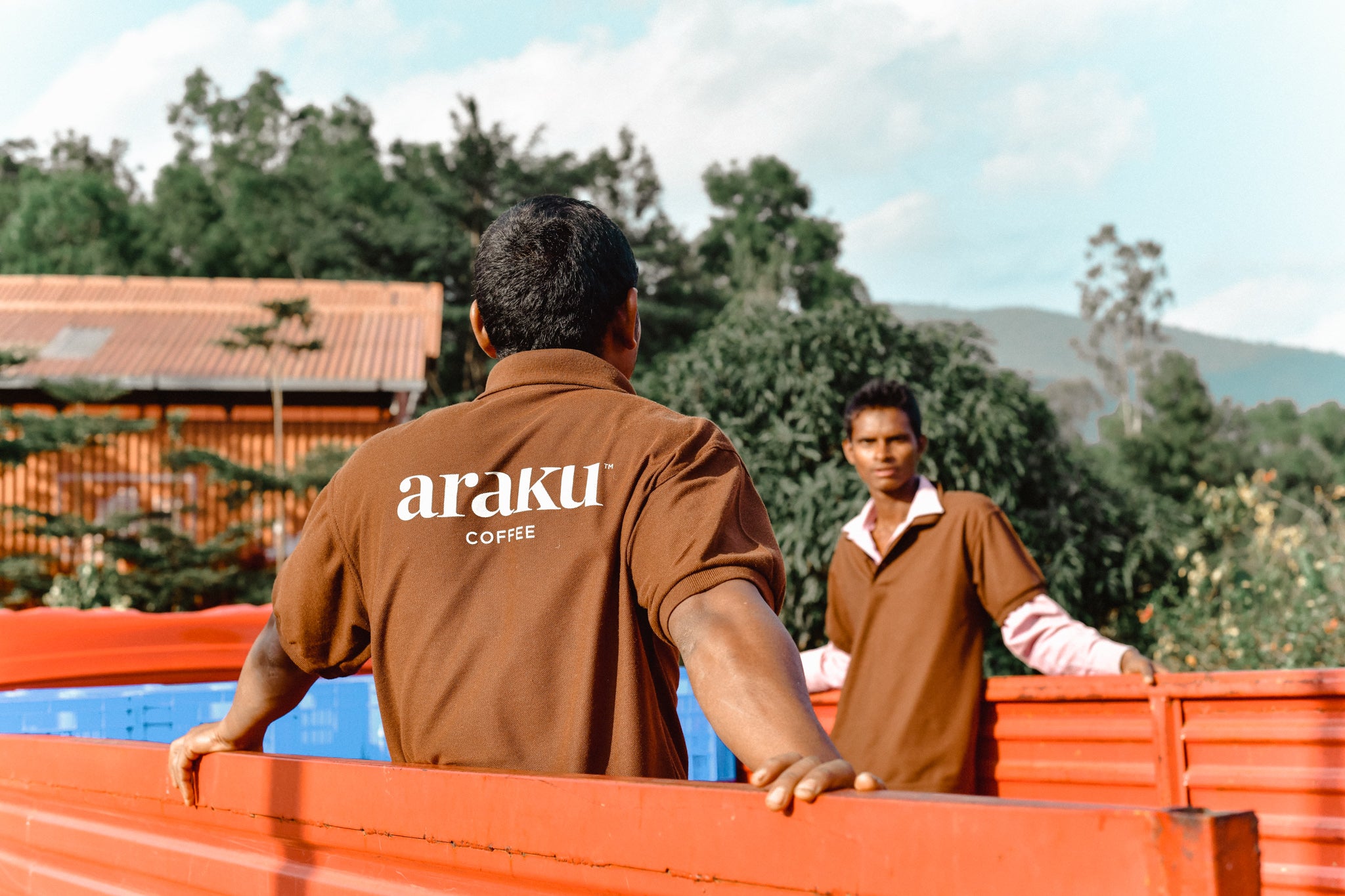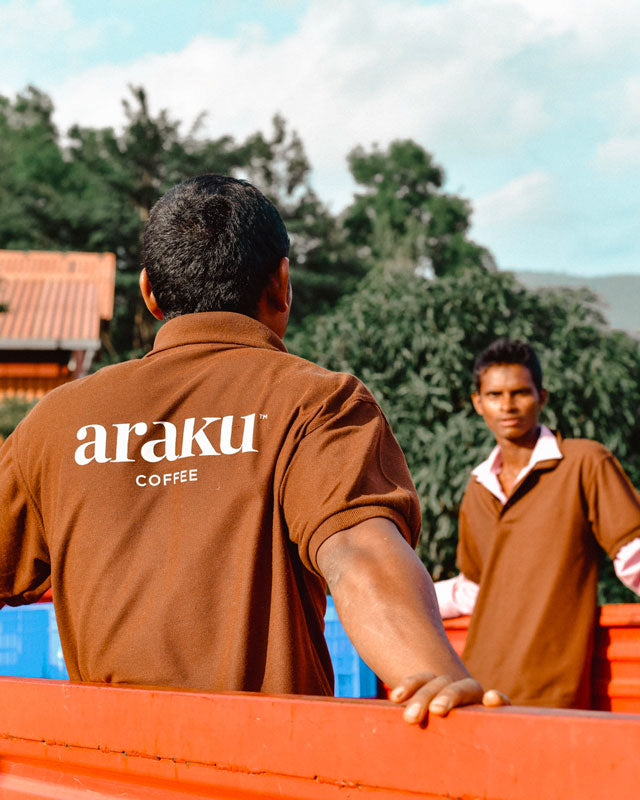
Araku specialty coffee
Every year, experts from the Specialty Coffee Association taste our 100% Arabica organic coffees and give us scores of up to 91 (out of 100). Here are the 19 steps that allow us to strive for excellence, from seed to cup.
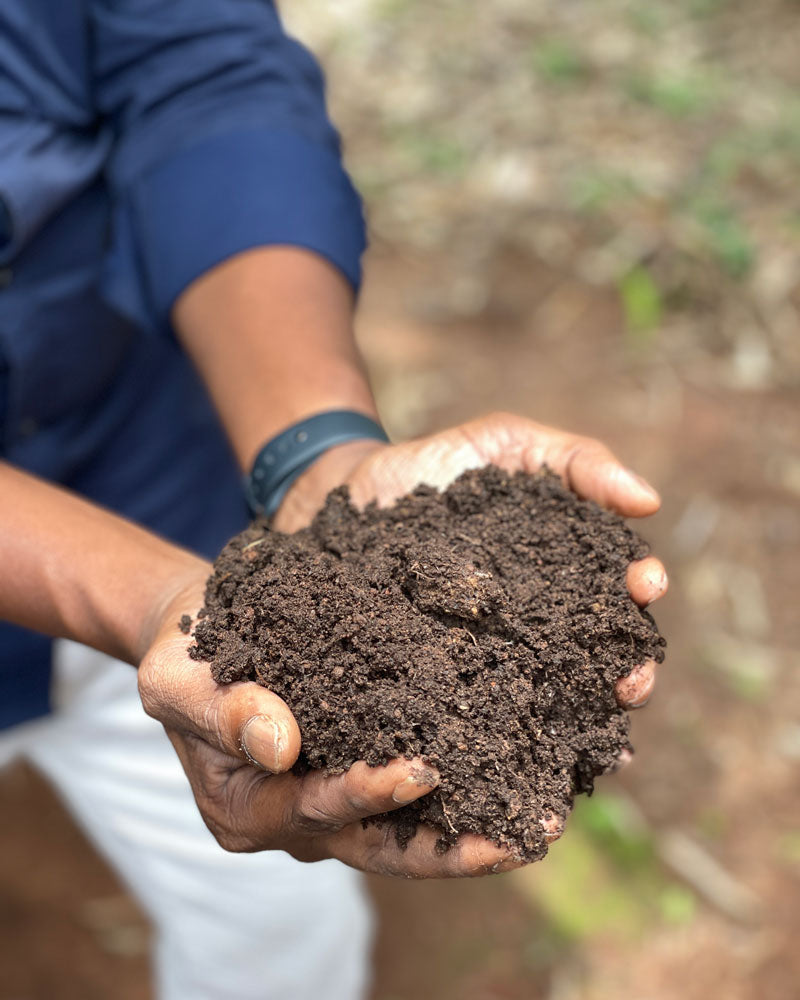
1. Down To Bedrock
The Earth loses about 23 billion tons of fertile soil every year. It is essential that our farmers choose practices that restore and strengthen soil organic matter. Rather than disturbing the soil by plowing it deeply, we prefer to prepare it for our Arabica coffee plantations with minimal intervention. This makes it easier for new plants to root, prevents erosion and improves the soil's ability to retain water. This is all the more essential as our coffee farms are located on hill slopes: the forest floor is left as is!
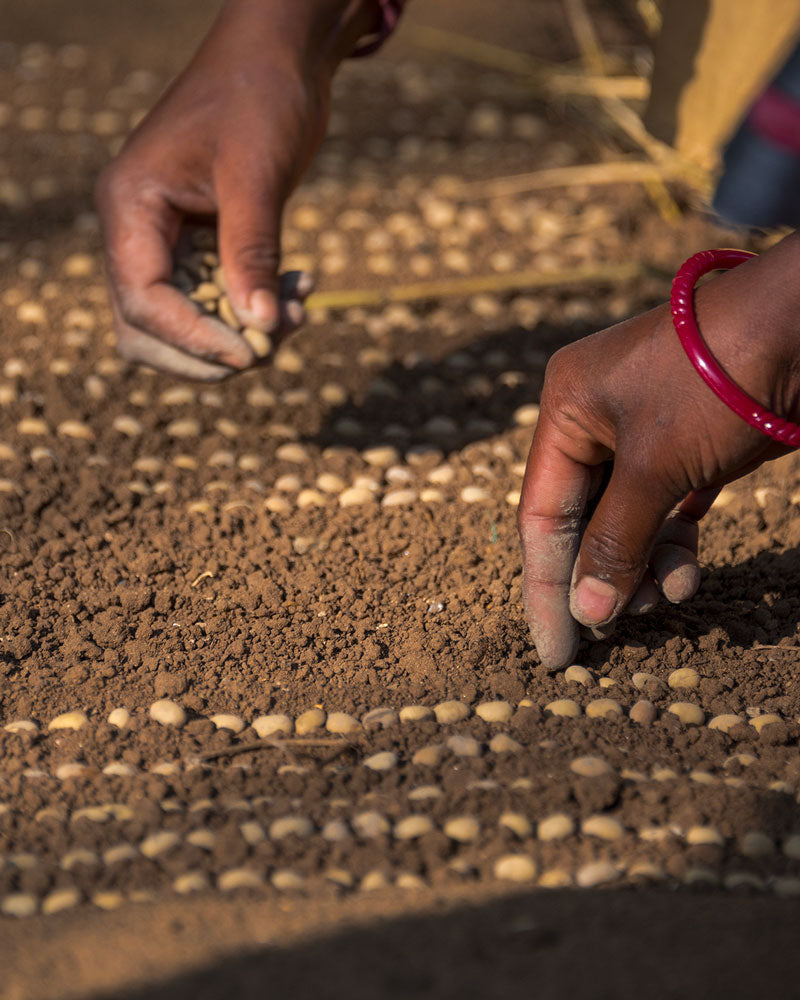
2. Need For Seed
We use a variety of Arabica called “Selection-9”. It is an indigenous Indian coffee, a hybridization between Ethiopian Arabica Tafarikela and Hybrido from Timor. Our farmers save the seeds of the mother shrub and work all year round to express their genetic potential. Each year, around 150 kilos of Arabica coffee seeds are harvested, which represents around half a million seeds!
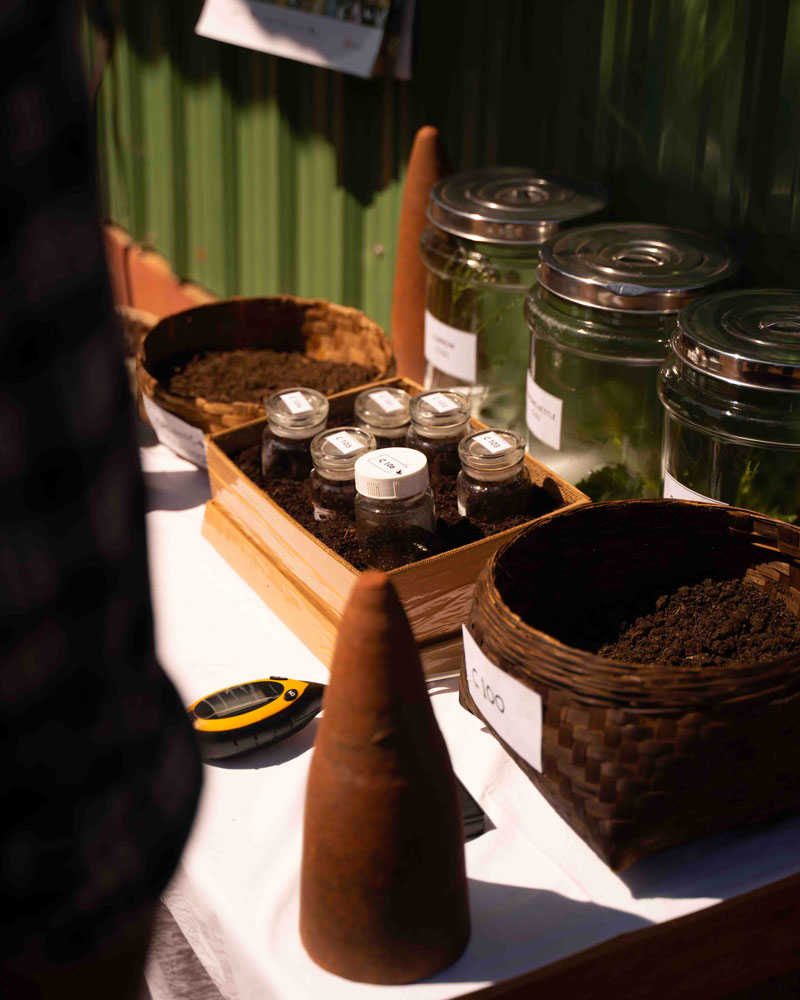
3. Microbiome = Big Deal
At ARAKU Coffee, we work exclusively using agricultural processes from regenerative agriculture. Unlike conventional practices that deprive the soil of its nutrients, ARAKU has created and patented organic bioinoculants that enrich and nourish the soil. What does this magic potion contain? Cow dung, eggshell powder, basalt powder and locally grown herbs. Our organic coffee seeds are therefore enriched by this homemade recipe (let's call it C100) before being sown in our central nursery in Hukumpeta, located in the heart of the Araku nature reserve, on the highlands overlooking the Bay of Bengal .
During the 45 to 60 days necessary for their germination, our arabica coffee seeds are regularly enriched with C100 until they reach 5 cm in height. At this point, the plants are carefully harvested and transferred to neighboring farming villages.
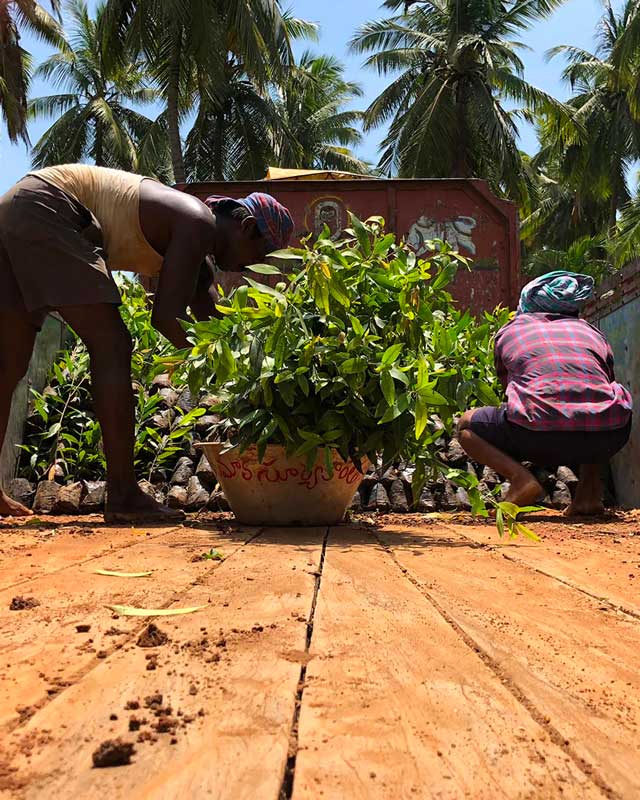
4. Green Thumbs
During this time, farming families prepare the micro-nurseries that will feed the arabica coffee plants. Each family prepares 50 to 100 polyethylene bags (depending on the number of plants), which they fill with soil, silt, compost... and magic potion of course. Within three months, the seedlings grow into young shoots of six leaves, ready to be replanted in the coffee plantations. In each village, volunteers were trained to support and guide farming families through this process.
Two bioinoculants are particularly effective when combined with C100:
- BLACK 100: prepared with cow dung in clay cones, black 100 helps enrich microbial activity, activates boron in the soil and improves its water retention.
- WHITE 100: concocted from siliceous quartz crystals in clay cones, white 100 is buried in soil rich in microbes from April to September (young growth stage) to bio-activate silica and promote photosynthesis of plants.
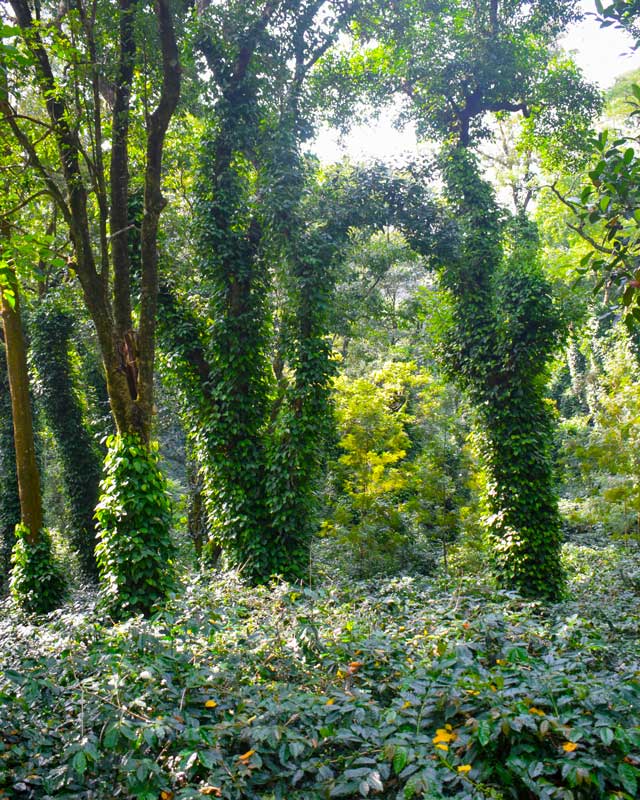
5. Tree Is Company Too
Your specialty coffee tastes like the forest it grew under! Growing coffee in agroforestry is a necessary condition, but not sufficient for making quality organic coffee. This is why we also pay attention to the diversity of native fruit forests that are cultivated by our producers. Thanks to the very strict scientific and agricultural support of experts who help us to reintroduce native species in the region, we are participating in regenerating the biodiversity of the Araku nature reserve. More than 21 horticultural species of fruit, forest and shade trees have been replanted there, such as the sapot tree, soursop tree, grapefruit tree, lemon tree, jamun and even elengi. In addition to improving the quality of the soil and that of our Arabica coffee, these trees also constitute an alternative source of income for farmers.
Finally, we also introduced trees rich in biomass and timber trees such as gliricidia, mahogany, arjuna and erythrina. These trees are essential for enriching the soil of plantations thanks to the annual fall of their leaves which helps to restore organic matter in the soil.
Furthermore, the entire landscape is mapped and the plantings carefully planned to create primary and secondary shade. The different heights of the canopy allow for higher quality beans to be grown since Arabica coffee is sensitive to direct sunlight. Biodiverse shade also helps maintain a lower average temperature than a single shade coffee farm; high temperatures make farms vulnerable to pests. Finally, native forests make excellent guardians for a coffee farm because trees with deep roots can withstand climatic hazards such as high winds and heavy rains.
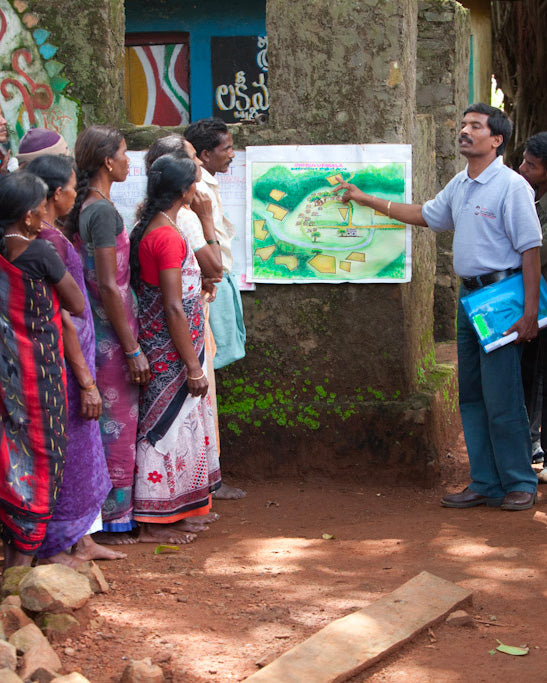
6. Back to (Farm) school
Shade management and pruning of coffee trees is essential to ensure that coffee trees receive the right amount of sunlight. Too much and the leaves will brown, too little and the cherries will ripen unevenly. This is where our agricultural field schools come into play.
In each village, two representatives are chosen by their farmer peers. They are trained in the best practices of regenerative agriculture by experts from the Naandi foundation, which has supported this project for 20 years. This training takes place in the field, every fortnight, and covers topics related to the time of year, with demonstrations by example and question-and-answer sessions. These volunteers then return to train their counterparts in their respective villages.
This teaching covers all aspects of organic coffee cultivation: coffee plants, planting fruit/forest trees, shade management, pruning and pruning trees, pest control, harvesting coffee cherries… This knowledge sharing helps transform the ARAKU farming community into coffee entrepreneurs.
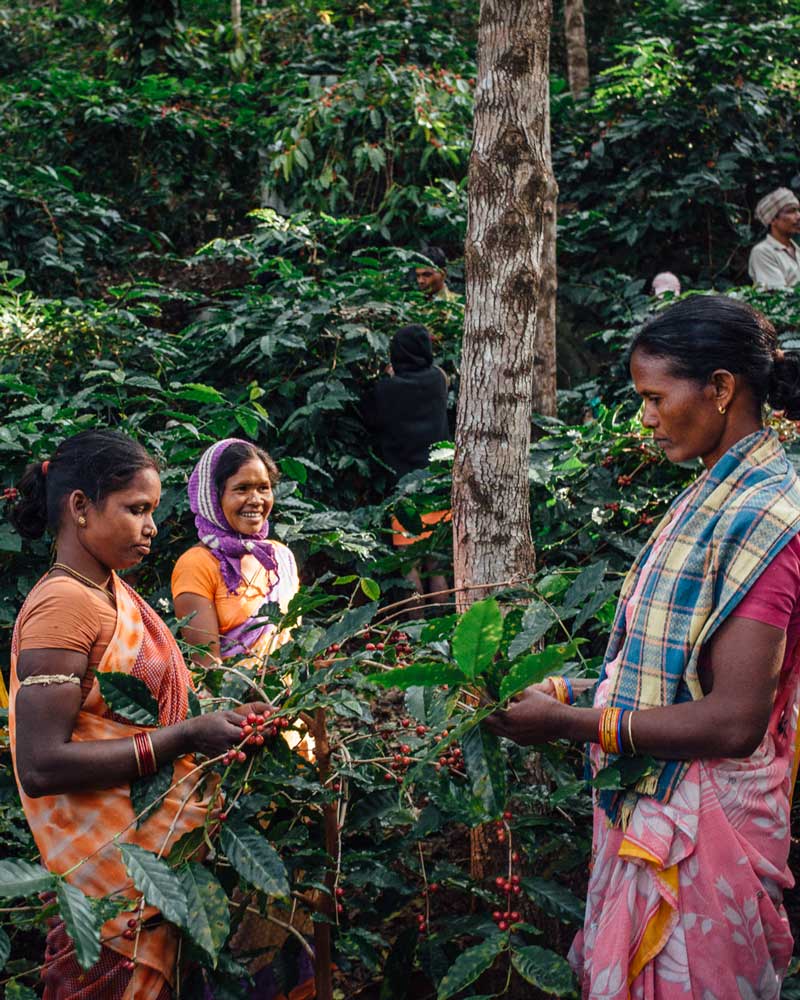
7. Terroir Speaks
The terroir is an essential element: it is largely what gives Araku specialty coffees such a distinct taste. Combined, the climate, the soil and the action of man contribute to creating a unique and incomparable product. This is what distinguishes Indian coffee from the Araku Valley from Colombian, Brazilian, Ethiopian or Indonesian coffee.
To develop our specialty coffees, we mapped the terroir of coffee farms in the Araku Valley. This allowed us to identify and classify each plot according to its own characteristics. The grouping of plots with similar characteristics gave birth to six specialty coffees with very varied aromatic profiles: Signature, Sélection, Grande Réserve, Micro Climat, Haute Altitude and Première Récolte. Farms located in these unique terroirs are independently managed by the coffee farmers, but are uniformly nourished by regenerative agricultural practices.
Before the harvest festival, our “Gems of Araku”, an expert group of microbiologists, scientists and coffee and agriculture specialists from around the world, visit the finalists to analyze the health of their farm . Several criteria are taken into account such as biodiversity, level of mulching, size, shade management, pest control, application of bioinoculants and interest in regenerative agriculture practices.
Based on the panel's contributions and the evaluation of an external expert, farmers are awarded titles such as "Best Farming Family", "Best Village", "Most Progressed Farming Family" and “Most Improved Village”. Since 2009, we have honored Araku farmers for the role they played in creating a world-renowned specialty coffee brand, while restoring the region's biodiversity. Their reforestation efforts have brought back spiders, earthworms and birds that had once fled this deteriorating landscape.
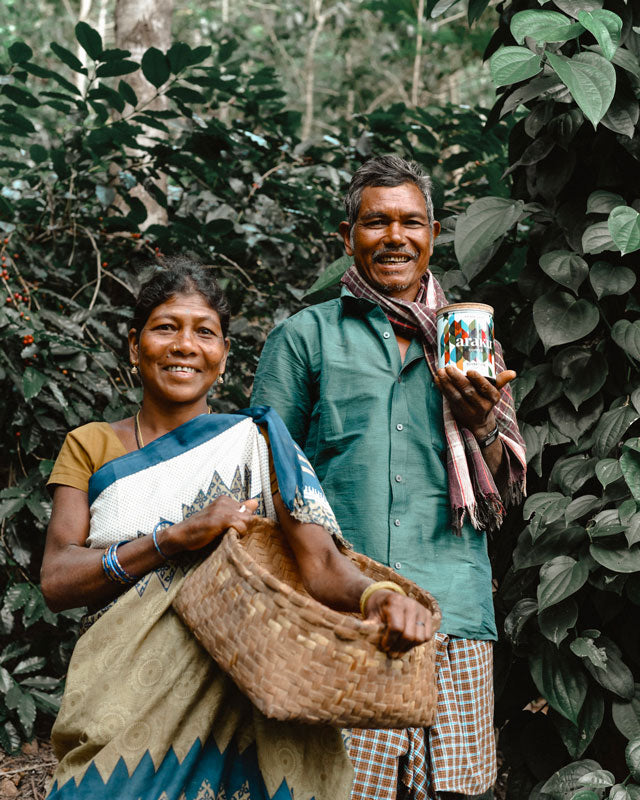
8. #Arakunomics: an innovative and caring vision
Our mission is summed up in 3 letters: PQR. Profit (for farmers), Quality (for consumers) and Regenerative agriculture (for the planet). The #Arakunomics philosophy, recognized by the Rockefeller Foundation, is a step in this direction - a decentralized approach to agriculture that protects the environment, while placing profits in the hands of farmers. We helped connect infrastructure, logistics and marketing to allow farmers to sell their specialty coffee without an intermediary, in Paris or Bangalore. By regaining total control of their supply chain, they were able to escape absolute poverty. and become entrepreneurs – while delivering world-class organic and fair trade certified Arabica coffee.
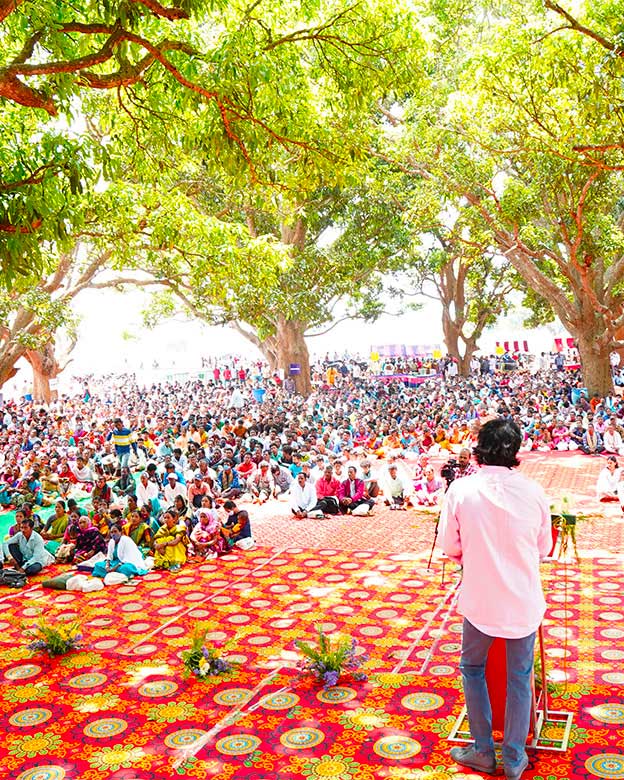
9. Coffee Collective
All our farmers are united within the ARAKU Coffee cooperative: the Small and Marginal Tribal Farmers' Mutually Aided Cooperative Society (SAMTFMACS). It is the largest organic and fair trade certified coffee cooperative in the world: SAMTFMACS today works with 524 villages and more than 10,000 farming families spread over 5,000 hectares of land.
She has played a crucial role in integrating ARAKU coffee farmers into international markets by giving them access to a global coffee supply chain…and sharing the value.
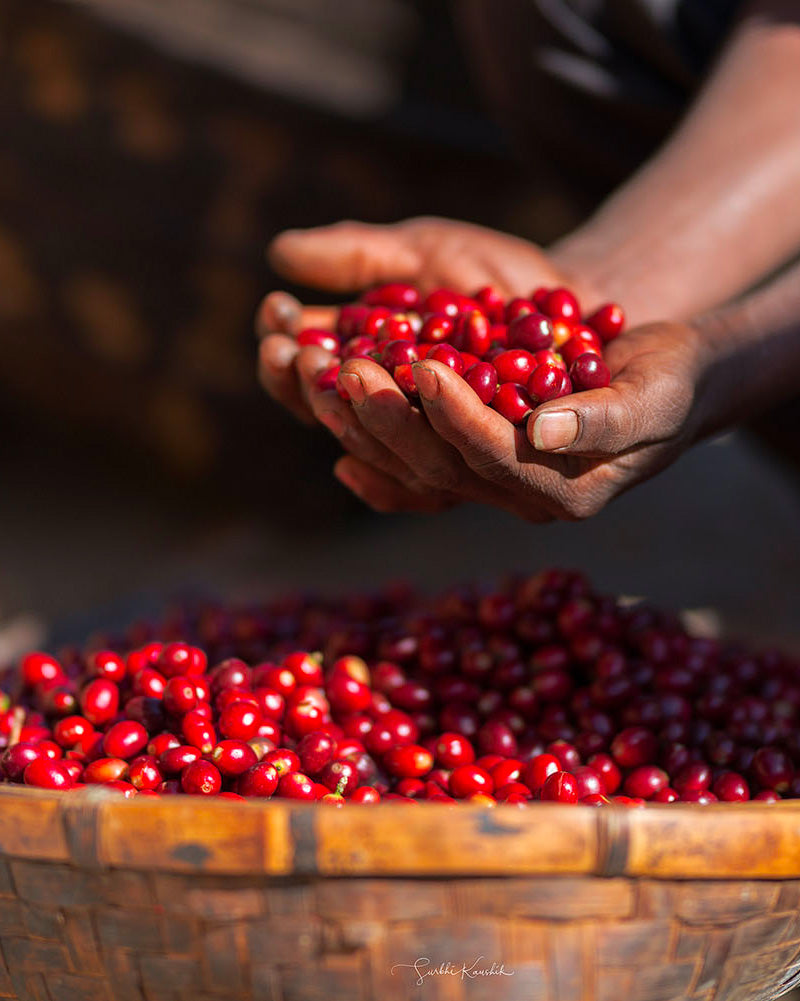
10. Cherry Pick
Our coffee cooperative, aka SAMTFMACS, and its volunteers help us every year to train hundreds of farmers in a crucial stage of the coffee harvest: that of the identification and control of ripe red cherries via manual harvesting , cherry by cherry. A batch of uniform dark red cherries is considered Grade 1 and has a higher value than any other shade of red cherry (Grade 2). It is not only a question of profit, but also of prestige and the ability to rebuild a forest of coffee trees with a fabulous yield.
Creating transparency with the farming community is an ongoing challenge. Farmers sort their coffee cherries into grade 1 and grade 2 packages at home. They are then invited to the village center where trucks arrive to collect their cherries. This step is followed by a member of the cooperative who supervises the entire process of collecting and weighing the coffee. The quantity and quality of production are recorded in the farmer's SAMTFMACS booklet and in the supply sheet for each village, so that everyone clearly has the same information.
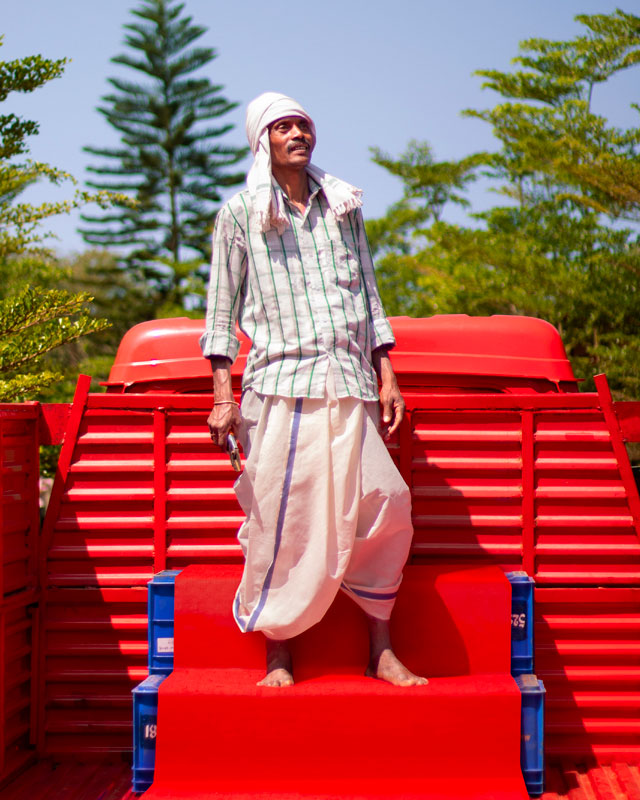
11. The “Red Truck” revolution
In the Araku Valley, where farming families traditionally make a living from subsistence farming (i.e. growing their own food), one of our biggest challenges has been to streamline collecting coffee from tribal farmers who are unfamiliar with production chains while respecting the need for consistent quality standards.
To effectively cover the more than 500 villages that supply ARAKU Indian coffee, a detailed supply plan is established each year to rank the villages according to the quality of their production.
In a village called “ Red Truck ” , the coffee plantations are in excellent health, the diversity of terroirs is maximum and the farmers collectively produce more than 5,000 kg of premium crimson cherries. As for the Blue Truck and Yellow Truck villages, farming families work together as a community to achieve Red Truck status, a symbol of prosperity.
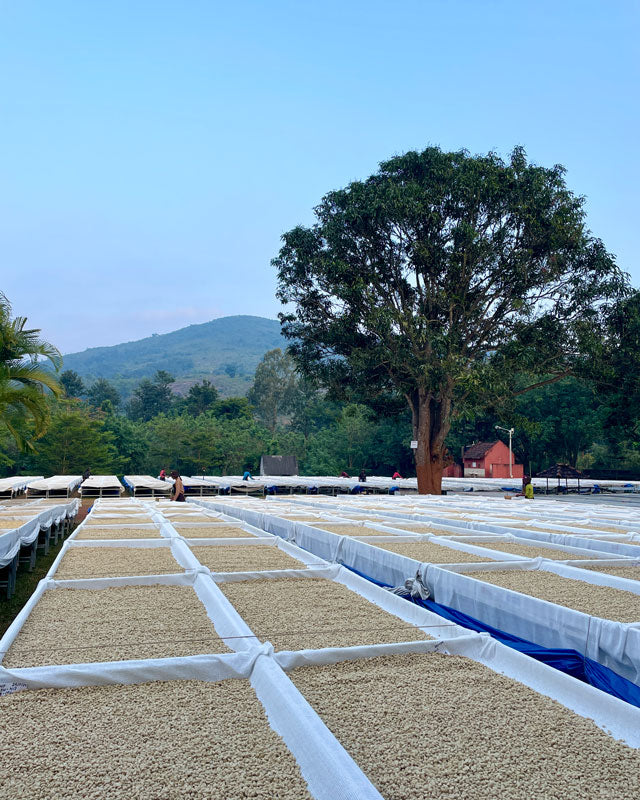
12. Process, Process, Process
Freshly harvested coffee cherries are transported to the cooperative's Central Processing Unit (CPU) on the same day of collection to be washed, dried and processed. This ultra-modern campus, the beating heart of the Araku Valley, covers 6.3 hectares and includes a drying area (with raised beds) and a pulping unit. The CPU also has a one-hectare farm where we grow fruits and vegetables but especially the herbs and flowers which are used in the composition of our bioinoculants: yarrow flower, German chamomile, nettle, Himalayan oak or even dandelion.
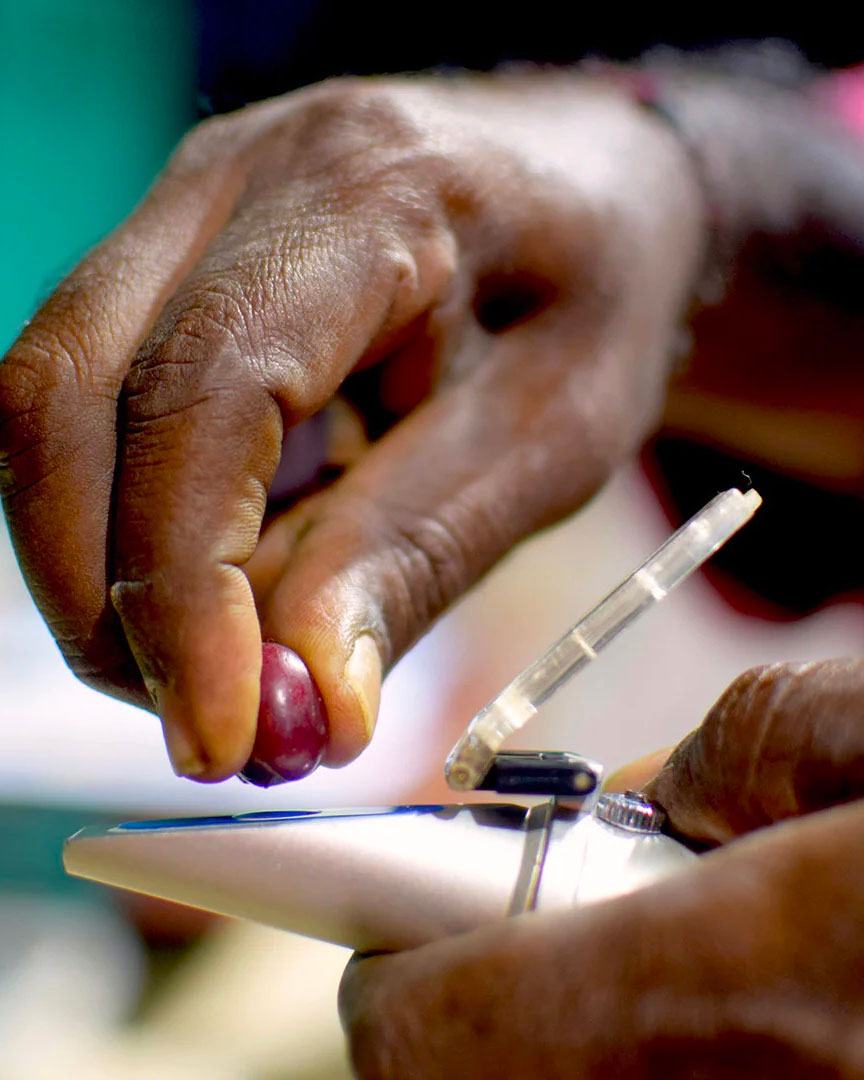
13. Brix by Brix
At the CPU, a team of experts carries out a second quality check on each case of coffee that arrives. The team also indexes the sweetness of coffee cherries using the Brix measuring device. The cherries selected for ARAKU organic specialty coffees have a Brix value of 20 and above. Any batch with a Brix value less than or equal to 15 is composted. The density of the cherries is also checked, because we only use those that sink into a water tank intended to receive the fruit. Each of our six organic Arabica coffees, from different terroirs, is then treated in a unique way in order to express its full potential.
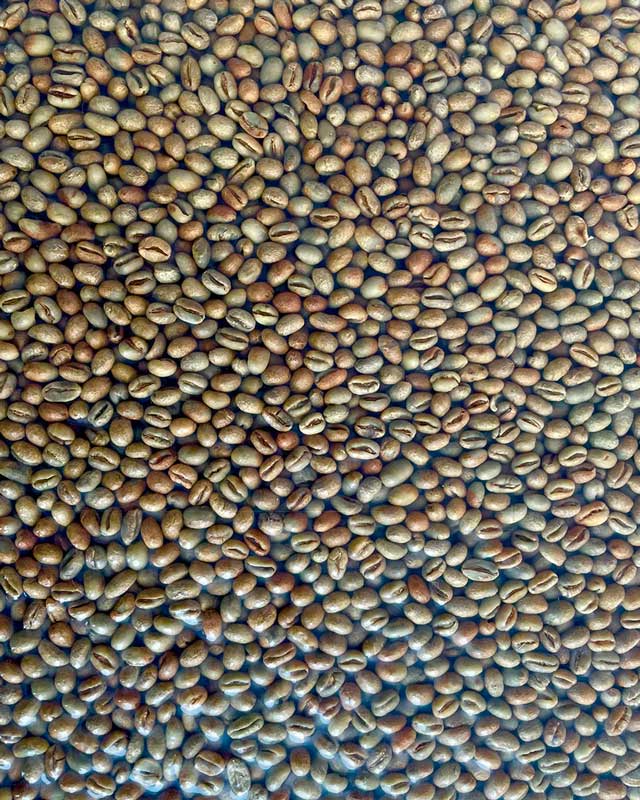
14. Dry Run
The desired coffee humidity levels vary depending on the processes used. Natural coffee is dried for 15 to 25 days to maintain a humidity level between 10 and 12%, while washed coffee is dried for 7 to 12 days to maintain a humidity level between 10 and 11.5 %. As for “honey” coffee, it is dried for 8 to 15 days to maintain a humidity level of between 10 and 11%. Humidity levels are precisely measured using moisture meters and the coffee is carefully observed to achieve optimal humidity levels. After the drying process, our organic coffee moves to the next stage of processing, called "curing".
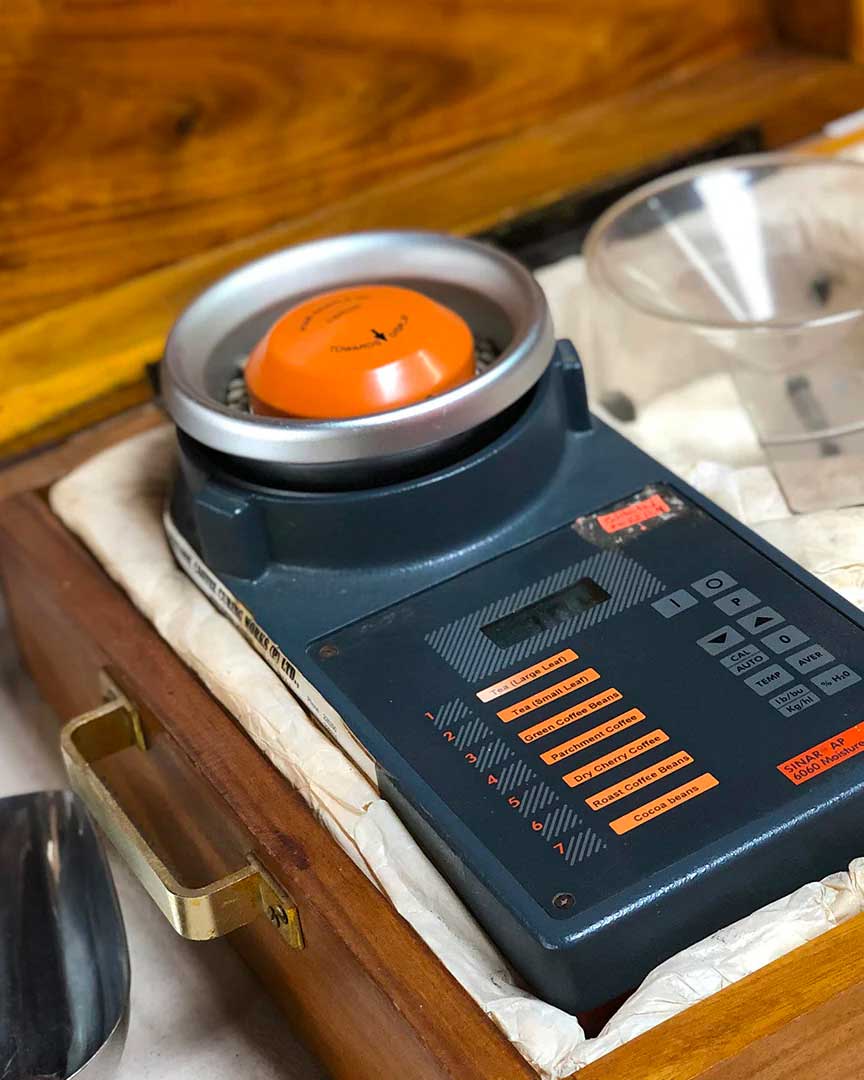
15. Coffee Cure(s)
Arabica coffee drying refers to a series of manual and machine-assisted operations by which raw coffee beans are transformed into green coffee – devoid of husk and parchment. At this point, the coffee beans are ready for storage or transportation. ARAKU Indian coffee is further processed in certified organic processing centers.
The first step in processing natural coffee is hulling: this involves removing the leathery skin that surrounds the coffee bean. For pulp-dried, washed and semi-washed coffee, the first step is peeling and polishing; the silver skin that remains on the green grain is removed by a polishing machine to improve its appearance.
In the second step, the green kernels are inspected in a color sorting machine to remove mottled, brown, dark, or irregularly shaped kernels.
Manual sorting is the third stage, during which a team of experts manually inspects the green coffee in order to eliminate further ones.
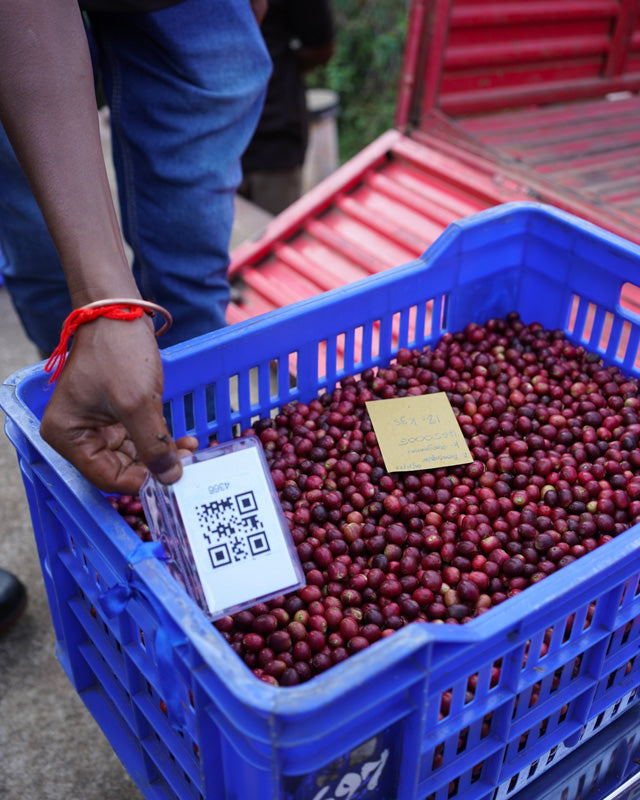
16. Track & Trace
We can tell you everything about our Araku organic specialty coffee: the farming families, the villages, the terroir, the type of processing, the storage date, the transport date for drying, the roasting date (more 'information on this subject soon!). We know everything behind your cup of ARAKU Arabica coffee! Every time our organic coffee changes hands, its details are meticulously recorded in a transparent system.
Even quality data is easily accessible. Each crate of cherries carries indicators concerning its quality, the name of its farmer and its plot number. When they arrive at the central unit, Arabica coffees of the same quality and from the same terroir are treated as a single batch.
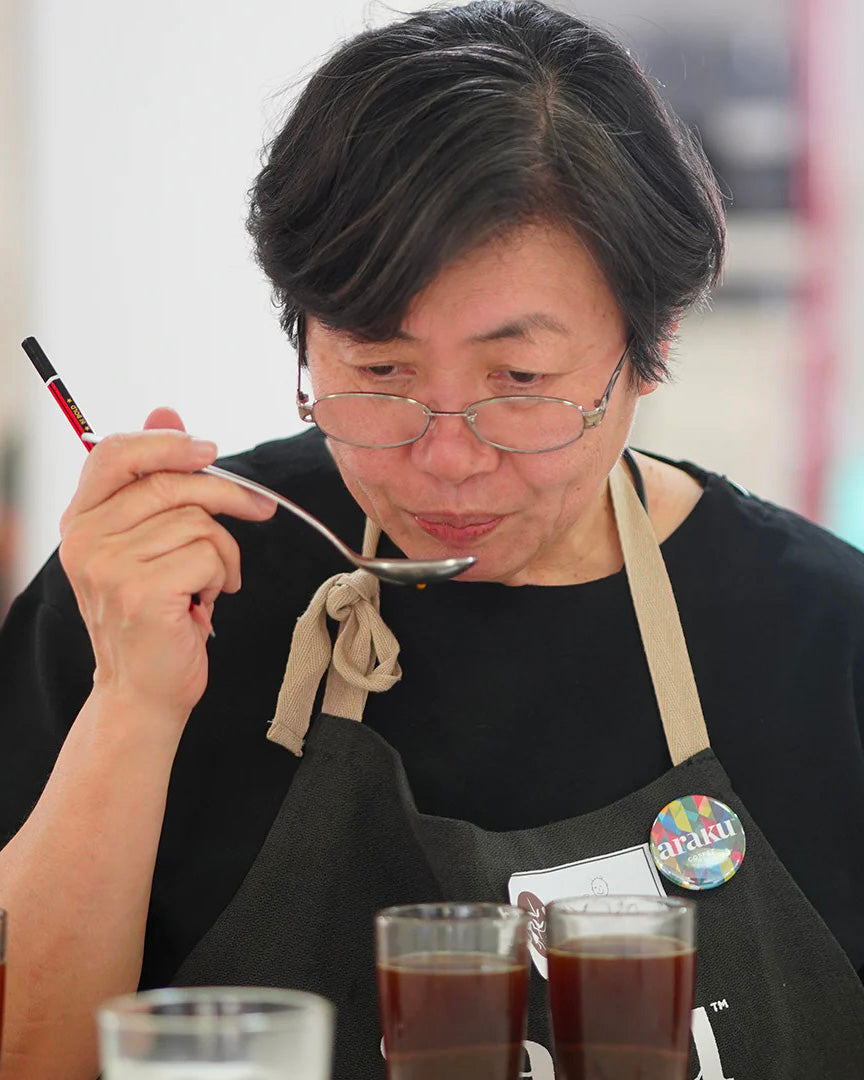
17. Global Experts, Local Coffee
Gems of Araku, the annual coffee harvest festival, attracts experts from around the world. This is where ARAKU Indian coffees are judged and rated by roasters and tasting experts from around the world, some of whom are Specialty Coffee Association (SCA) certified trainers or members of the Cup of Excellence.
The SCA is a non-profit organization that represents thousands of coffee professionals: it supports activities aimed at making specialty coffee a prosperous, equitable and sustainable business for all players in the value chain. The SCA rates each coffee on a scale of 1 to 100 through a rigorous tasting process. This process is based on 10 principles: scent, flavor, aftertaste, acidity, body, uniformity, balance, cleanliness of the cup, sweetness and overall score.
Specialty coffees score 80+ points for clarity and complexity. These exceptional coffees represent only 5% of world production. Grand cru coffees, for their part, obtain 90 points or more.
In 2020, we broke several records. This is the first time that all ARAKU organic Arabica coffees have been declared specialty coffees by an international jury from Canada, Bulgaria and the United States. Two of our batches of organic coffee scored 95 points, the highest score in the history of ARAKU Indian coffees, placing them in an exclusive club of less than 20 hand-picked coffees from around the world. That same year, 19 batches of Araku organic Arabica coffee obtained more than 90 points. All our coffees sold under the ARAKU brand in France have obtained a minimum of 85 points, thus proudly affirming their specialty coffee status!
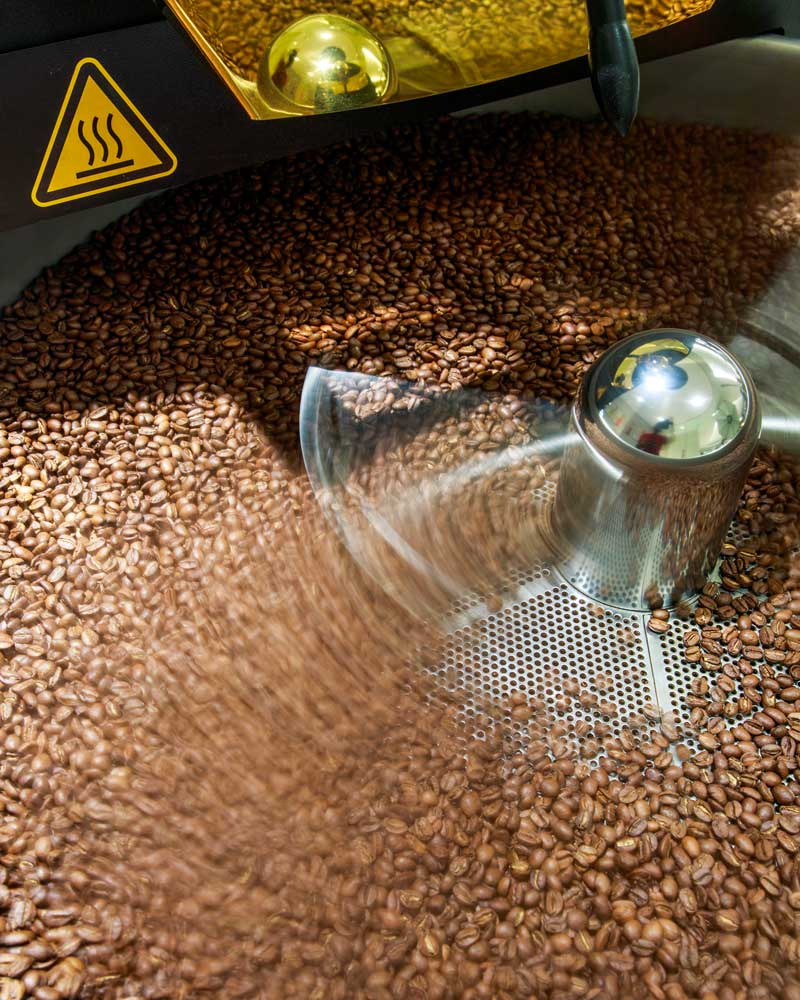
18. Signed, Sealed, Delivered
Our award-winning specialty coffees are auctioned off to the highest bidder in micro-lots via gemsofaraku.com. Recognition and financial reward allow farmers to improve the economic model of their farm. Gems of Araku helps farmers build direct, long-term relationships with buyers who value the premium coffees they produce. Our buyers around the world prefer green coffee beans because they can roast them to create their own blends. We export our green beans to South Korea, Switzerland, Canada, United Kingdom, Japan, France, Bulgaria and Ukraine.
For ARAKU Signature, Micro Climat, Grande Réserve, Sélection, Haute Altitude and Première Récolte Indian coffees, we roast the green beans less than 200 km from Paris. Our specialty coffees are roasted on demand, just before being served at points of sale, sold to our partners or shipped to your home, anywhere in France.
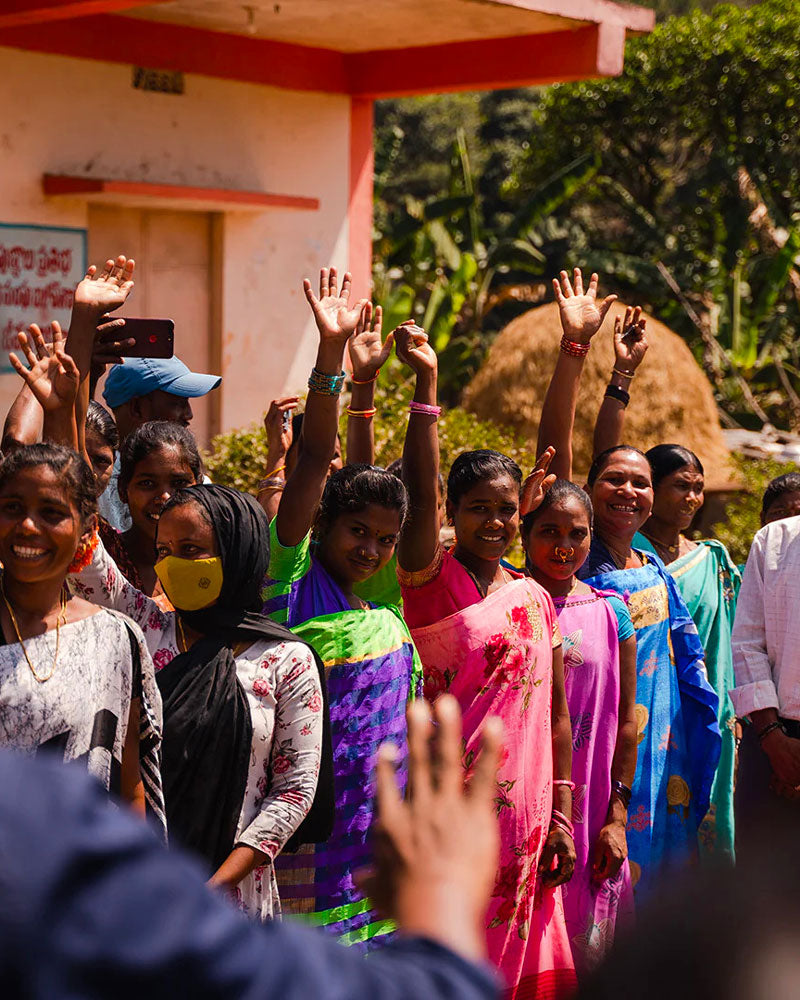
19. Farmers, Volunteers & You
The development of the first local Indian coffee, both organic and fair trade certified, was a long and complicated adventure: it has now lasted for more than 20 years. The Naandi Foundation team, village volunteers, coffee cooperative members and, finally, the heroes of our story - the farmers of ARAKU - had to put in tireless efforts to achieve excellence.
Thanks to ARAKU Indian coffee, tribal farmers from the Eastern Ghats of India have seen their work celebrated in the heart of Paris, in the brand's very first organic coffee shop, and in Bengaluru, our first Indian flagship.
#Arakunomics has transformed lives and has since become a model recognized by the Rockefeller Foundation's Food System Vision 2050 Prize. In 2018, the World Economic Forum shared our journey, describing “how indigenous Indian farmers are fighting deforestation with organic gourmet coffee.”
This was all possible because of you - you helped make ARAKU Arabica Coffee a globally recognized specialty coffee brand. For your trust and faith in premium coffee, and for your unwavering support.


